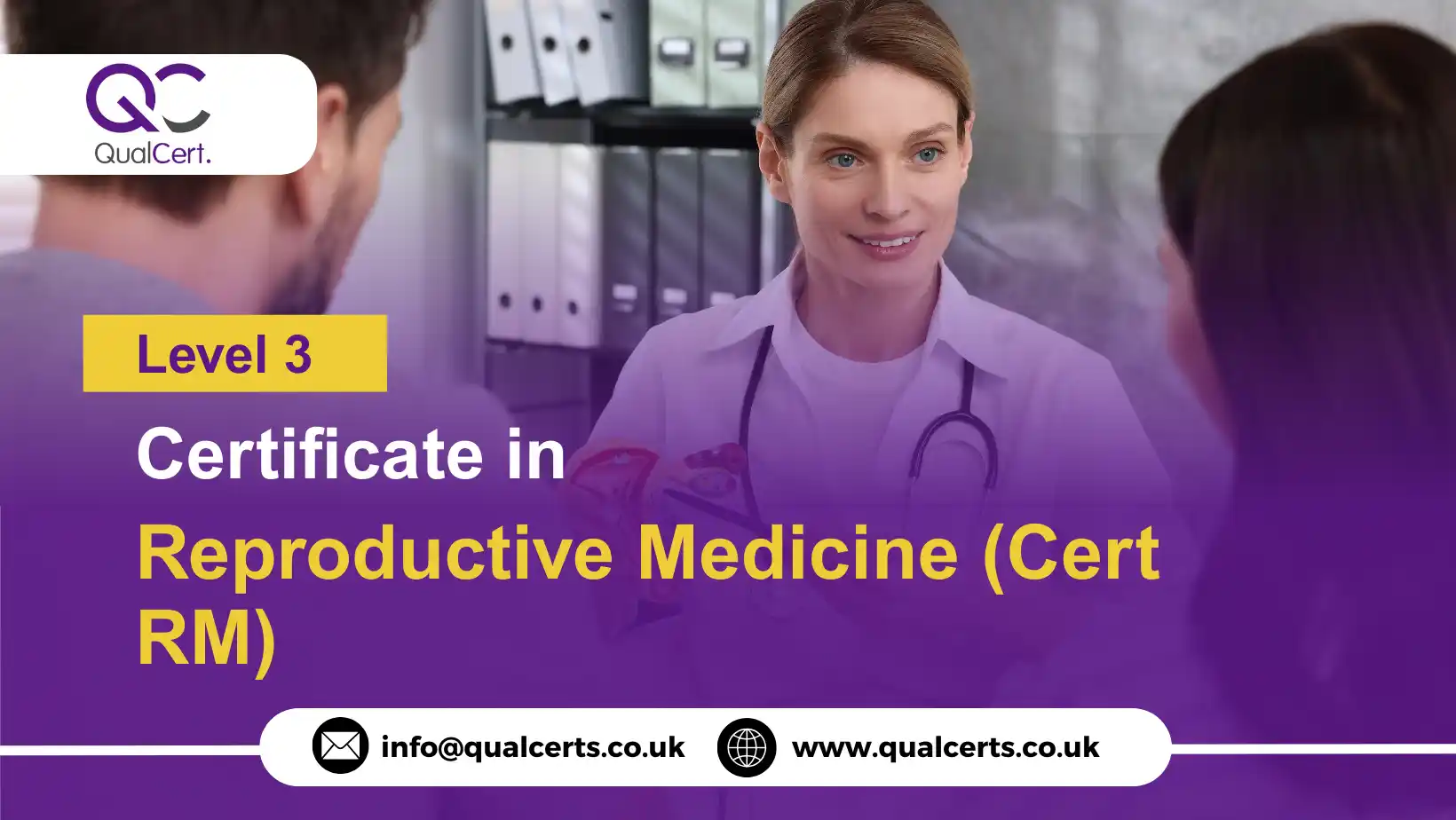The QualCert Level 3 Certificate in Reproductive Medicine (Cert RM) is a specialised qualification designed for healthcare professionals seeking advanced knowledge and practical skills in the field of reproductive health. This course provides comprehensive insight into human reproduction, fertility management, and the latest medical interventions used in assisted reproductive technologies. It equips learners with the expertise needed to support patients effectively throughout fertility assessment, treatment, and reproductive care processes.
The curriculum covers essential areas including reproductive anatomy and physiology, fertility assessment, conception challenges, assisted reproductive technologies such as IVF and IUI, ethical considerations, and patient-centred care strategies. Learners also gain an understanding of hormone regulation, diagnostic tools, and current clinical guidelines for managing reproductive health issues. Emphasis is placed on applying evidence-based practices and maintaining high standards of patient safety and care.
This qualification is ideal for nurses, fertility specialists, allied health professionals, and healthcare practitioners working in reproductive medicine clinics, hospitals, or private healthcare settings. It is also suitable for professionals aiming to specialise in reproductive health, enhance their clinical expertise, or achieve formal recognition for their skills in fertility and reproductive care.
The QualCert Level 3 Certificate in Reproductive Medicine adheres to UK professional standards and international best practices, ensuring learners are equipped to deliver safe, effective, and compassionate care in reproductive health. Completing this course enables professionals to improve patient outcomes, advance their careers, and contribute effectively to multidisciplinary teams in reproductive medicine.
Course Contents of QualCert Level 3 Certificate in Reproductive Medicine (Cert RM):
TheQualCert Level 3 Certificate in Reproductive Medicine (Cert RM), offers 20 Credits, requiring a Total Qualification Time (TQT) of 100 hours, including 70 Guided Learning Hours (GLH).
| Unit Ref# | Unit Title | Credit | GLH | TQT |
| QC27094-1 | Principles of Reproductive Medicine | 4 | 14 | 20 |
| QC27094-2 | Human Reproductive Anatomy and Physiology | 4 | 14 | 20 |
| QC27094-3 | Fertility Assessment and Diagnosis | 4 | 14 | 20 |
| QC27094-4 | Assisted Reproductive Technologies and Interventions | 4 | 14 | 20 |
| QC27094-5 | Professional Practice, Ethics, and Patient Care in Reproductive Medicine | 4 | 14 | 20 |
Entry Requirements for the QualCert Level 3 Certificate in Reproductive Medicine (Cert RM):
Minimum Age:
- 18 years or older
Educational Background:
- Level 2 qualification in Health and Social Care, Nursing, or a related medical field
- GCSEs in English and Science are preferred
Experience:
- Previous experience in healthcare, clinical, or fertility-related roles is recommended
- Experience in patient assessment, reproductive care, or medical procedures is advantageous
Language Proficiency:
- Competency in English is required
- International learners may need to provide evidence of English proficiency, such as IELTS 5.5 or equivalent
Commitment to Continuing Professional Development (CPD):
- Willingness to engage in continuous professional learning and apply knowledge in practice
Access to Resources:
- Access to clinical or simulated environments, fertility equipment, and learning resources for practical learning
Learning Outcomes for theQualCert Level 3 Certificate in Reproductive Medicine (Cert RM):
Principles of Reproductive Medicine
- Understand the fundamental concepts of reproductive medicine
- Explain factors affecting fertility in men and women
- Describe common reproductive disorders and their clinical implications
- Apply evidence-based approaches in reproductive health practice
Human Reproductive Anatomy and Physiology
- Describe the anatomy of the male and female reproductive systems
- Explain the physiological processes involved in conception, menstruation, and pregnancy
- Understand hormonal regulation and its role in reproduction
- Apply anatomical and physiological knowledge to clinical assessment and care
Fertility Assessment and Diagnosis
- Conduct comprehensive fertility assessments for patients
- Interpret diagnostic tests and clinical data relevant to reproductive health
- Identify potential causes of infertility in men and women
- Develop evidence-based care plans based on assessment outcomes
Assisted Reproductive Technologies and Interventions
- Understand procedures such as IVF, IUI, and other assisted reproductive technologies
- Apply best practices in patient preparation and post-procedure care
- Monitor and evaluate the effectiveness of reproductive interventions
- Recognise risks and complications associated with fertility treatments
Professional Practice, Ethics, and Patient Care in Reproductive Medicine
- Apply ethical principles and professional standards in reproductive medicine
- Provide patient-centred care that respects cultural and individual values
- Communicate effectively with patients, families, and multidisciplinary teams
- Reflect on practice to enhance patient outcomes and professional competence
Healthcare Professionals:
- Nurses, doctors, fertility specialists, and allied health professionals working in reproductive medicine or related clinical areas
Career-Focused Individuals:
- Professionals aiming to advance their careers in fertility, reproductive health, or assisted reproductive technology services
Individuals Seeking Formal Recognition:
- Professionals who want certified evidence of their skills, knowledge, and competence in reproductive medicine
Support Staff:
- Healthcare assistants and clinical support staff involved in reproductive care seeking to enhance their understanding and practical skills
Qualified Trainers and Assessors:
- Centres must employ experienced healthcare and reproductive medicine professionals to deliver training and assess learners effectively
Facilities and Resources:
- Access to clinical or simulated fertility environments, appropriate reproductive medical equipment, and up-to-date learning materials
Health and Safety Compliance:
- Strict adherence to infection control, patient safety, and ethical standards in clinical and reproductive practice
Quality Assurance:
- Systems to monitor learner progress, maintain assessment standards, and implement continuous improvement processes
Learner Support:
- Academic and pastoral support must be available, including provisions for learners with additional needs

